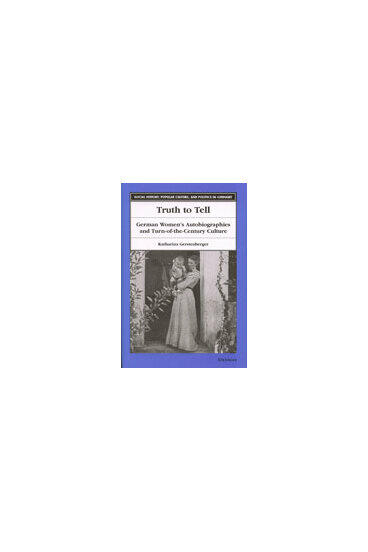Truth to Tell
German Women's Autobiographies and Turn-of-the-Century Culture
What did "woman" mean at the fin-de-siècle?
Description
Focusing on seminal but hereto-fore neglected autobiographies by German and Austrian women from the turn of the twentieth century, Truth to Tell shows how women positioned themselves between tradition and modernity and how they shaped many of the cultural and political discourses at their particular junction in history.
Katharina Gerstenberger argues that women autobiographers responded articulately to the vicissitudes of modernity. What did "woman" mean at the fin-de-siècle Women autobiographers sought to answer this fundamental question as they themselves remained a part of the subject under debate. The cultural meanings of this paradox, the deployment of female autobiography in the gender debates, and the autobiographical strategies of women writers are the subject of this book. Elucidating the tensions between tradition and change, female autobiographers enrich our understanding of the gendered discourses of nation, race, and sexuality that occupied their contemporaries.
The book discusses in depth the works of four autobiographers. German-born Nahida Lazarus describes her conversion to Judaism during a time when Jews were increasingly marked as racial outsiders. Margarete von Eckenbrecher, a colonizer and settler's wife, narrates how the anticolonial war of 1904 shattered her hopes of farm life in German Southwest Africa. The Austrian Social Democrat Adelheid Popp recalls her impoverished childhood in late-nineteenth-century Vienna. Finally, Wanda von Sacher-Masoch, wife of the Austrian writer Leopold von Sacher-Masoch, describes her journey through the sexual and literary practices of masochism.
Combining major insights of cultural studies with analyses based on close readings, Gerstenberger argues that social and cultural concerns of the time are reflected as well as refracted in the autobiographies of women writers. Her work implies, moreover, that seemingly unrelated issues such as colonialism and religious conversion intersect in one of the most troubling problems of modernity, the question of race.
Truth to Tell adds significant new dimensions to our knowledge of turn-of-the-century culture. This book will be of interest to scholars of German, gender, and literary studies.
Katharina Gerstenberger is Associate Professor of German, University of Cincinnati.
Katharina Gerstenberger is Associate Professor of German, University of Cincinnati.
Reviews
"[Gerstenber] successfully moves these texts from the margins to the center of our understanding of the complex cultural, social and political transformations that mark the turn of the 19th century in central Europe. The book will therefore be of great interest to students and scholars of German studies, feminist studies and others interested in interdisciplinary approaches to modernism and turn-of-the-century culture."
- Friederike Eigler, Georgetown University
---Friederike Eigler, Georgetown University, From typescript for German Quarterly, June 2001
". . . a welcome addition to the growing critical discussion concerning the intersections of gender, writing, and subjectivity."
- Ruth-Ellen B. Jones
---Ruth-Ellen B. Jones, Biography, Fall 2002
". . . her perspective reconnects the many complex strands of women's identity through the prism of gender. Indeed, her compelling approach demonstrates the quite extraordinary powers of gender to challenge assertions and assumptions in the wider historiography."
- Jean H. Quataert, Binghamton University, SUNY
---Jean H. Quataert, Binghamton University, SUNY, German History, Volume 1, No. 1 (2003)
". . . a welcome contribution to the study of gender in turn-of-the century Germany and Austria, skillfully bridging the disciplines of literary studies and history. Gerstenberger cogently demonstrates how each autobiographer attempted to carve out a unique identity in a world in which modernity disrupted traditional gender roles. . . . One of Gerstenberger's key contributions is her investigation of race during the era of German imperialism."
- Sara Ann Sewell, Virginia Wesleyan College
---Sara Ann Sewell, Virginia Wesleyan College, German Studies Review, February 2003
". . . Gerstenberger's book provides a great service to scholars by introducing readers to four remarkable women of fin-de-siècle Europe. It is valuable for its contributions both to the field of women's social history and to the study of turn-of-the-century German culture."
- Beverley Driver Eddy, Dickinson College
---Beverley Driver Eddy, Dickinson College, Journal of English and German Philology, July 2002

